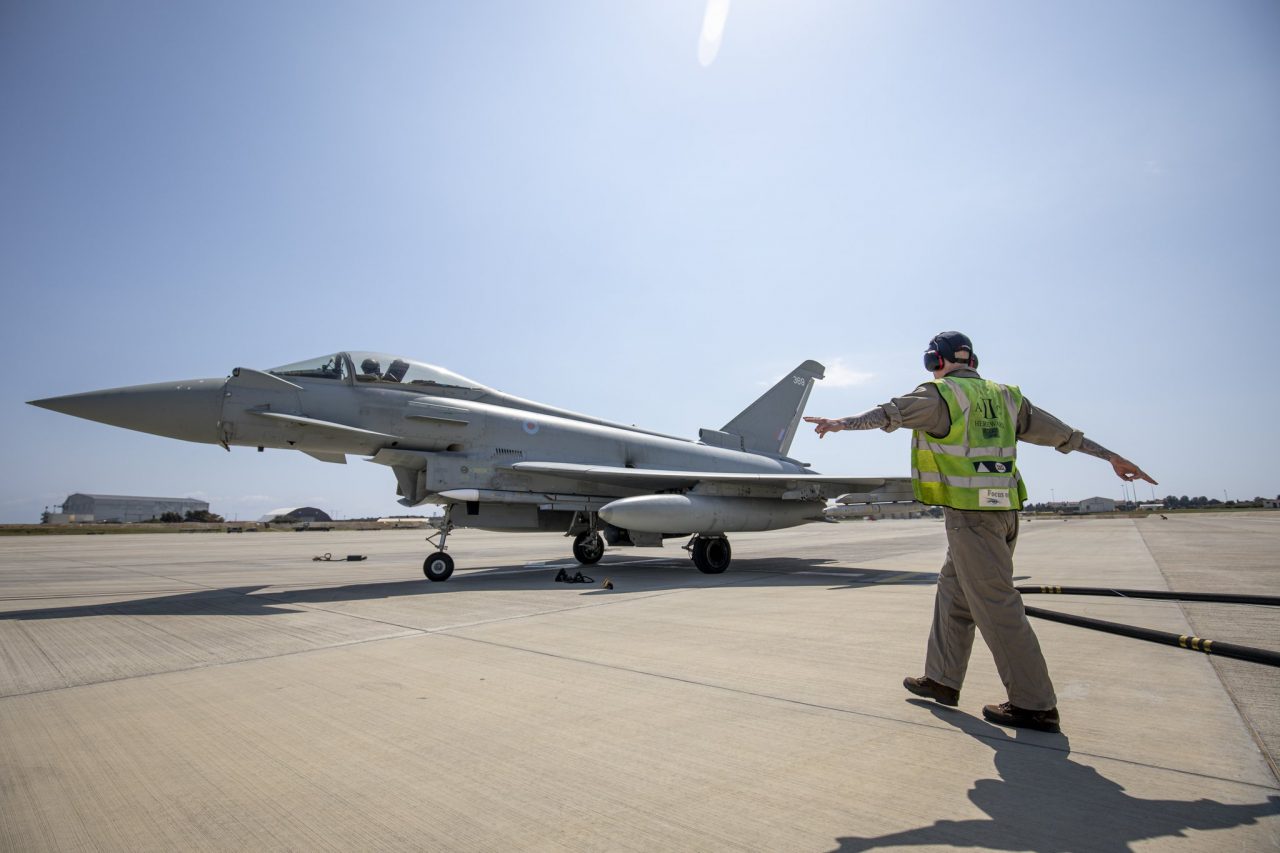With its request to buy 40 additional F-16s and 80 modernization kits from the US still to be responded to, Turkey has announced its interest in the “more capable” Eurofighter Typhoon.
Ankara highly regards the twin-engine, delta-wing, thrust vectoring British-German-Italian-Spanish jet’s reduced radar cross-section, sensor fusion, avionics, and super-cruise capability.
Hoping to get the Typhoon’s latest Tranche 3A or four variant, Turkey wants to acquire the F-16s or the Eurofighters as a stop-gap arrangement until its homegrown Turkish Aerospace Industries (TAI) TF-X takes to the skies in the next few years. TF-X is Turkey’s first indigenous jet fighter project.
Interestingly, British Aerospace Engineering (BAE), the UK firm part of the Eurofighter program, is also helping TAI develop the TF-X’s stealth technology.
At the same time, engine maker Rolls Royce is expected to supply the jet powerplant with its local partner Kale. TAI has partnered with Airbus and Leonardo on the CN-235 aircraft, Cougar helicopter, A-4000M transport aircraft, and Augusta Westland 129 helicopter.
According to a report by Ragip Soylu and Dania Akkad in the Middle East Eye, Turkish Air Force Commander General Hasan Kucukakyuz had visited the United Kingdom, the leading producer in the Eurofighter consortium, and met Royal Air Force Commander Air Chief Marshal Sir Mike Wingston.
Kucukakyuz also inspected the UK Quick Reaction Alert that flies with Typhoon aircraft.

“The Typhoons are very good, in excellent quality. They could be a stop-gap option until we get the fifth generation and locally produced TF-X in our hands, of course, if we cannot get the F-16s,” the MEE report quoted an unnamed official.
The F-16 has been the mainstay of the Turkish Armed Forces (TSK) for the last 35 years, with 270 F-16 C/Ds in service, and is one of the five countries that produce the jet domestically. Its local arms industry also provides maintenance and upgrade support.
The Typhoon is a NATO aircraft, multirole capable and falling in the 4++ generation category that ticks all the boxes of a suitable alternative to the F-16.
“In addition, the Typhoon could operate in Future Combat Air Systems (FCAS or Tempest), allowing Eurofighter and partner companies time to mature technologies on the platform. It also includes areas such as training opportunities in complex multi-domain scenarios. These technological lessons learned could benefit Turkey’s TF-X program.
With the new software and hardware upgrade packages Eurofighter is developing, the Typhoon will be capable of countering threats or challenges that might arise up to the 2060s, making it not only a stop-gap solution but also a complete upgrade in capabilities for the Turkish Air Force,” said an op-ed in Turkey’s leading news website, Daily Sabah.
The United States dropped Turkey from the F-35 program in July 2019 for its procurement of the Russian S-400 system, which the US said could detect and expose its stealth features. Then, in September 2021, Ankara made the F-16 proposal, over which it still awaits a response.
The deal has geopolitical implications too. If the US Congress approves the F-16 sale, Turkey will likely remove its veto over Sweden and Finland’s accession to the North Atlantic Treaty Organization (NATO).
It opposes the Nordic nations hosting exiled activists of the Kurdistan Workers Party (PKK), which has waged a long insurgency in Turkey’s south and which Ankara considers a terrorist organization.
It is already threatening an offensive in northern Syria where PKK-affiliate People’s Protection Units (YPG) hold territory if Sweden and Finland don’t ban their representatives there. Its tensions with Greece and Cyprus in the eastern Mediterranean are unresolved with routine shows of force and power projections.
In the early days of the war, Turkey had refused to join anti-Russian sanctions, especially oil and gas purchases, which was an adequate signal to Moscow that Ankara wasn’t throwing in its lot with the US camp. It instead tried brokering peace by holding Russian and Ukrainian negotiators at its Antalya Dialogue event.
But Russo-Turkish relations are considered the most bizarre in the diplomatic world. Ankara is known to exploit the Western card against Moscow while maintaining close business and defense relations. Turkey openly acts against Russian interests in Ukraine and is in the opposite camps in the conflicts in Syria, Libya, and the South Caucasus.
It has supplied Kyiv with its popular Bayraktar TB-2 drones, which the Ukrainian Armed Forces (UAF) used with notable success against Russian troops, armor, and artillery while also losing a substantial amount to surface-to-air (SAM) missiles.
Russia has levers on Turkey too. It controls tourist flows in Turkey’s Antalya region, is a massive market for Turkish fruits and organic products, and constructing a civilian nuclear power plant at Akkuyu.
- The author can be reached at satamp@gmail.com
- Follow EurAsian Times on Google News




